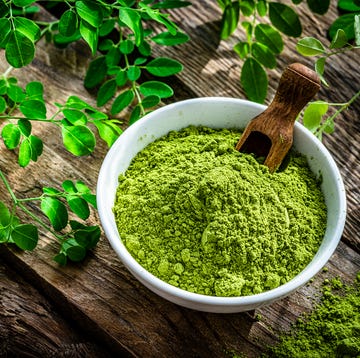It’s known as "navel pulling," and involves massaging castor oil on your belly button and abdominal area. To do what exactly? Well, #IYKYK, but according to social media fans the hack helps with bloating and could ease digestion issues, like constipation.
While there may be some actual health benefits from pouring castor oil on your belly button and rubbing it around, those benefits are mostly of the skincare variety. Castor oil, when used topically, has anti-microbial and anti-inflammatory properties, and it’s a good moisturizer. But can it do more than that? Let’s do a gut check (pun intended).
What is castor oil?
Castor oil is a vegetable oil derived from the seeds of the tropical Ricinus communis, or castor plant, naturally found in Africa, India and South America. It’s a thick, goopy oil that’s not used for cooking, but has been touted for its hair conditioning benefits and as an effective emollient for skin.
Castor oil has been used topically in Traditional Chinese Medicine to treat diarrhea, and Ayurvedic medicine as a natural remedy for stomach issues. “In the Ayurvedic tradition, the belly button is a special place linked to the origin of life, and it’s thought that there’s a gland in your navel can absorb substances and transfer their therapeutic benefits to the rest of the body, but there is no medical evidence that this is true,” says Anish A. Sheth, M.D., practicing Penn Medicine physician and Chief of Gastroenterology at Princeton Medical Center, as well co-director of PMC’s Center for Digestive Health and director of its GERD Program.
Does rubbing castor oil on your belly button help with bloat or digestion?
In a word: No. “There’s no medical evidence that that topical castor oil does anything,” says Sheth. What about the massaging part? “This is the most likely explanation of how this trend might temporarily help with digestion or bloating. Abdominal massage has been shown to relax the abdominal wall and also promote peristalsis, the downward contractions and movement of the GI tract, which can help with digestion and constipation.”
Sheth does note that when taken orally, castor oil can act as a stimulant laxative. “But it is quite harsh and could cause severe abdominal cramps. It’s not recommended for regular use. Frankly, there are better options at your drugstore to treat constipation.” Doctors recommend upping your intake of dietary fiber and drinking more water, for starters.
The bottom line
“There is no scientific basis for navel pulling,” says Sheth, “but there is also no real downside. Castor oil is good for the skin, and who doesn’t love a belly rub? But for optimal gut health, stick with proven treatments like probiotics or a high-fiber diet.”
There are gentler, more effective home remedies for constipation, such as drinking more water and upping your intake of dietary fiber. And there are better fixes for bloating and gas: Slowing down when you eat or avoiding certain gas-inducing foods like dairy products, carbonated beverages, and legumes such as beans or lentils.













